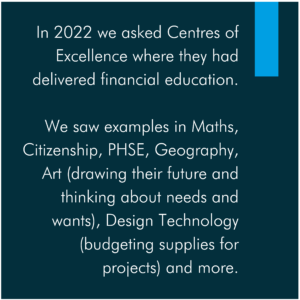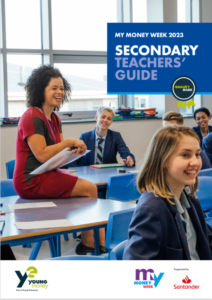Money Heroes Story Books:
Ed and Bunny books (3-7) and Super Stories books (7-11) are a great way to engage your students with money matters. Visit the Money Heroes website to access books in various formats and activities to use alongside them.

Financial education has been a statutory part of the secondary curriculum since 2014. Developing financial capability in students, doesn’t have to be covered in a maths class, it can be taught across the curriculum via a range of methods including through applied learning activities which can help ground core skills in a real world context.
My Money Week is a national activity week that provides an excellent opportunity to get young people (aged 3-19) interested in financial matters and develop the skills, knowledge and confidence they need to thrive in society.
We asked Tash Cooper, an Associate Head responsible for careers education at an Academy in Nottingham why she loves My Money Week.
Bullwell Academy achieved its financial education Centre of Excellence accreditation in 2022. Tash shares examples of how developing their students’ financial capability is a cross-curricular endeavour.
A few years ago we were looking to revamp our finance curriculum, so I did a Google search and saw that My Money Week was coming up. For us, it was perfect timing to put money in the minds of our students.
Money is more important to students now compared to when we were younger. Social media, contactless payments and other changes mean that students have more wants, but often don’t understand their family’s needs. I’m hugely passionate about developing the whole child, so that they’re not just academically ready, but also informed about real-life matters too.
 What do you do during My Money Week?
What do you do during My Money Week?We run tutor sessions for all students on savings and spending, and hold an assembly that challenges the stigma of being in a community classed as ‘highly deprived’. Subjects such as business and geography explore topics related to money, and we run homework competitions. Some students will also be lucky enough to observe guest speakers or take part in workshops.
For us, securing the backing of our Senior Leadership Team has been vital. I presented my vision to them, and they were and remain 100% supportive. Joint planning time was implemented for staff so they could plan and develop resources and ideas. It’s useful to have access to the My Money Week Hub resources, as these demonstrate good practice for staff to follow, and have been used as exemplars and a standard against which to measure any other resources we produce ourselves.
Increased awareness among students about the money around them. With the access students have to accurate and up-to-date information, they can make informed choices regarding money, now and in the future. My Money Week helps to highlight how important understanding money is. We’ll be taking part in the week, and making it an exciting and engaging time for our students.
“[The students] just really thoroughly enjoyed it ‘til the stage they were like, ‘when can we do some more?’, and it was great because it was followed on by our school’s Enterprise Day where they got to spend money and budget, so it lent itself really nicely to building on the skills that they had learnt from that week and just seeing their confidence was incredible” – Secondary school teacher
“What I like about Money Week is that we have an entire week that is dedicated to that focus and it’s nice to kind of walk down the corridor [and] see kids talking about money. […] I think those conversations are so important.” – Primary school teacher
“I only got my debit card this year and I didn’t feel really confident in it, I didn’t really know how to use it as well. But then after we spoke about it in class and in maths, I felt more confident using it and how to use it.” – Student
“It’s not something that’s optional to learn about. If you don’t learn about it, then you’re not going to survive, I guess. It’s like you’re not going to have a nice life if you don’t know what to do with your money.” – Student